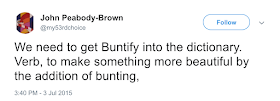Updated links for #Buntingmas 2023 on Tuesday 11 April 2023.
Original post
Buntingmas (or The Festival of Bunting) is a thing I invented in 2019 to celebrate bunting. The first Buntingmas is on Saturday 11th April 2020. I'm still working out the details ;)
While I'm not particularly pro-monarchy (I don't much mind them) I remember greatly enjoying the 'floribunta' that bloomed across UK high streets in 2011 when one of the royals got married.
Tom Scott created Buntify the internets, a bunting overlay for websites that wanted to do do their civic bunting duty. It was a bit of fun that let you add bunting and a patriotic jingle to any website. There were even bunting fights in supermarkets as they ran out of the tethered celebratory flags. Then in 2012 we had all the Olympic bunting so there were a couple of years of fairly heavy bunting exposure.
The very simple aim of Buntingmas is to 'put up' some bunting in whatever way 'put up' is relevant for you. If you hate bunting don't do that and instead you are merely encouraged to 'put up with' bunting.
I think of the 'type specimen' of bunting as a series of fabric pointed flags strung together but it's up to each individual Buntingmas celebrant to decide what sort of flags, pennants or other types of bunting to use.
1. Craft options
2. Classroom activities and other educational opportunities
3. Other posts I've written about Buntingmas
4. Gallery of my favourite bunting
1. Craft options
These might include paper/card and string bunting, knitted or crocheted bunting as well as the more classic fabric bunting creations. There's also bunting jewellery made of polymer clay, bunting 'toppers' to stick on cakes or fondant edible bunting as in the video below. Sometimes there are bunting making classes / workshops.
Or you can just buy bunting.
2. Classroom activities and other educational opportunities
While bunting has a celebratory air about it, the wider use of flags as a communication tool is pretty fun and interesting.
- Signal flags and codes in the classroom
- How to teach semaphore using flags
- For younger classrooms each child could make a 'personal flag' (including stuff on it that they feel best represents them) either to decorate the room or take home. The instructions suggest getting other classmates to guess who created each flag.
The photo of the flags on a boat below actually spell out 'Welcome Aboard', using the code of the international maritime signal flags. I have a tea-towel with the signal flags info on it (Mr Brown also wears an apron with the pattern on in Paddington 2).
3. Other posts I've written about Buntingmas
• Heraldic shields to print and colour in for #Buntingmas (8 April 2022)
• #Buntingmas 2022 - basically let's all put a bit of bunting up (3 April 2022)
• Vaguely Celtic 'bunting' for Buntingmas made from acetate OHP sheets and glass paints (11 April 2021)
• Make your own heraldic bunting for #Buntingmas (10 April 2020)
• An even easier way to make bunting from folded paper - no printer needed #Buntingmas (9 April 2020)
• #Buntingmas (it's 11 Apr): How to make low-tech bunting from paper (1 April 2020)
4. Gallery of my favourite bunting
All photos taken by me, most are on Twitter.
Mini-bunting above comes from Tiger in Lewisham, though it has shops all over the place. This bunting is permanently installed above my kitchen door. Tiger / Flying Tiger occasionally also sells mini bunting as well as larger garlands.
I created the above space-themed bunting using laminated paper (designed on PowerPoint, with images added). It tells the story of the film I'm screening (The Dish) at the 2018 Charlton and Woolwich Free Film Festival. The bunting is attached to one of the guy ropes holding up the open air screen set up in the grounds of Charlton House. My boss' son now owns this bunting. (I also made some work-themed bunting for my boss' office).
Imagine all this bunting whiffling in the breeze at the 2017 Wilderness Festival. Someone had festooned the Information Tent with colourful bunting making it very easy to find.
This is a lantern I made for the Dec 2018 Blackheath Village Day at the bunting making workshops held in Blackheath Halls / Conservatoire. The logo / theme of BVD is actually bunting (!) so I adopted that for the theme of my lantern, lit with a battery-operated tea-light.
Bunting in the colour of the Ukrainian flag, patterns available to download: Heraldic shields to print and colour in for #Buntingmas (8 April 2022)


















